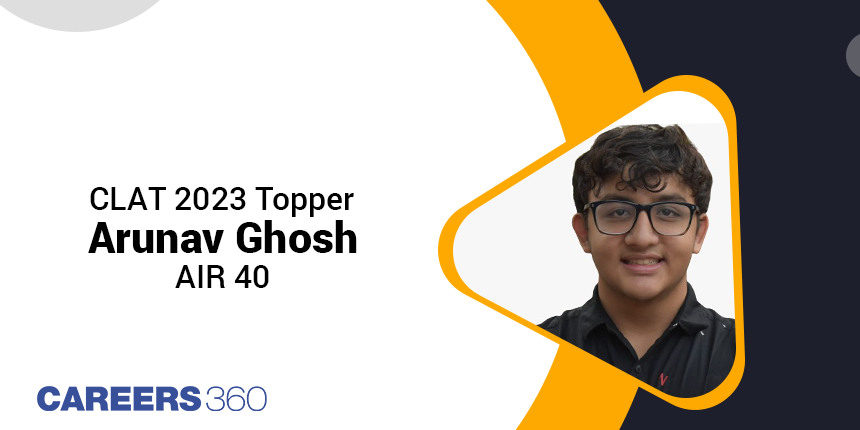CLAT 2023 Topper Interview: Arunav Ghosh, AIR 40 says, “Be consistent in your preparation”
When you dream big, you have to work hard for it. There is no shortcut to success. The fruit of hard work is always sweet. Same happened with the CLAT 2023 AIR 40 Arunav Ghosh. The Kolkata topper, Arunav Ghosh has shared a few tips and suggestions for CLAT 2023 exam aspirants. In conversation with Careers360, he says, curiosity towards the subject and interest in a particular field is important. Continuous practice and dedication towards a goal is the key. Read the complete interview of Arunav Ghosh (AIR 40, CLAT 2023) below.

Question: Which NLU did you select?
I chose NLSIU Bangalore as my first preference before the CLAT exam.
Question: How was the CLAT exam this year?
The CLAT question paper was a standard paper with an expected level of difficulty. The sections were of reasonable quality and difficulty. The GK questions rewarded a general interest in world affairs rather than a targeted preparation approach.
Question: Why did you select law as a career?
Law is not just a profession or an occupation. It is a lens which can be used to observe almost any development in the world. I choose to study law to be able to observe society from this lens. Also, because I believe that the five years spent in the BA LLB degree will offer me the clarity required to understand what I want from the work I do. My initial interest in law developed as a result of participating in competitive debating and reading the works of my idol, Dr. B. R. Ambedkar.
Question: Which school you are studying and what is your stream?
I am a student of the Humanities stream in DPS Newtown. I opted for the these subjects - Political Science, Economics, Sociology, Legal Studies
Question: What have been your other achievements?
I was a part of an ISDS development squad at the World School's Debating Championship earlier this year, and have received several accolades for participating in various public speaking events and research-related programmes.
Question: How do you rate this achievement?
I am satisfied with the work I have put in to prepare for the CLAT entrance exam over the last two years.
Question: What are the three main reasons for your success?
The three main reasons I would like to credit are - keeping an open and curious mind which meant that I took an interest in various subjects and liked to read about them, the support of my fellow aspirants and loved ones, and trust and faith in the guidance given by my mentor, Mr. Rajneesh Singh.
Question: What would you like to suggest to your juniors?
Aspirants should first try to reflect and understand why they want to seek a legal education, because that creates a resolve which is important during the final days before the entrance exam itself, and try to engage themselves in their interests beyond the preparation for the test, be consistent in their preparation and to always be kind and supportive towards their peers.
Popular Courses and Specializations
Popular Degrees
List of colleges accepting CLAT
Browse Law Colleges by State
Questions related to CLAT
On Question asked by student community
Hi, you can apply for admissions in Nirma University, NFSU Ahemdabad, Alliance, IPU University and affiliated instiutes (in case you are reserved category candidates), UPES Dehradun, BITS Law School etc.
Start preparing for CLAT by first understanding the exam pattern and syllabus, which includes English, Current Affairs, Legal Reasoning, Logical Reasoning, and Quantitative Techniques. Make a simple daily routine and begin with basics read newspapers regularly for current affairs, practice comprehension passages for English and legal sections, and solve basic
Hello,
With a CLAT AIR of 33599 and SC category rank of 2103, and being a Delhi domicile, your chances at IP University (GGSIPU) are moderate to good, especially in later counselling rounds.
Based on previous year trends, some IPU-affiliated law colleges have closed at higher SC category ranks, so
Hello,
The counselling and seat allotment process for CLAT 2026 has already begun and with seats reserved for various categories including OBCs
They have not separately released the list for OBC for Lucknow NLU , they releases a round wise allotment list and allot them seats according to their rank.
Hello
With an AIR of 9076 and EWS rank of 846 in CLAT 2026, getting a top NLUs is unlikely, which is why you didn’t get a seat in the first round. However, you still have some chances in lower-tier NLUs like NLU Odisha, NLU Assam, NLU Tripura, NLU Meghalaya,
Start a career in Law. Admissions Open for LLB courses for
Among top 100 Universities Globally in the Times Higher Education (THE) Interdisciplinary Science Rankings 2026
Chandigarh University Admissions 2026
ApplyNAAC A+ Accredited | Among top 2% Universities Globally (QS World University Rankings 2026)
Manav Rachna University Law Admissions 2026
ApplyAdmissions open for B.A. LL.B. (Hons.), B.B.A. LL.B. (Hons.) and LL.B Program (3 Years) | School of Law, MRU ranked No. 1 in Law Schools of Excellence in India by GHRDC (2023)
Unitedworld School of Law Admissions 2026
ApplyMoot Court | Mock trials | Legal Aid Clinic
SRM University, Chennai Law UG 2026
ApplyNAAC A++ Accredited | Ranked #11 by NIRF
VIT Chennai Law Admissions 2026
Apply#14 in India by NIRF Ranking | NAAC A++ accredited | Approved by BCI | Scholarships Available
